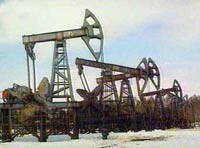Oil prices rise on news of strike in Nigeria and BP fire in Alaska
Oil prices rose Thursday in Asia, extending overnight gains on news of a surprise strike at Chevron Corp. facilities in Nigeria and another fire at BP PLC's Alaskan oil field.

Light, sweet crude for November delivery climbed 20 cents to US$81.50 a barrel in Asian electronic trading on the New York Mercantile Exchange by midmorning in Singapore. The contract rose US$1.04 to settle at US$81.30 a barrel Wednesday in New York.
Oil prices often rise when oil supplies are threatened in Nigeria, Africa's biggest oil producer and one of the top overseas suppliers to the United States.
"Employees of some of the companies providing labor workforce to Chevron, and belonging to the National Union of Petroleum and Natural Gas Workers ... initiated (a) strike" at six facilities, Chevron said in a statement, adding that production was unaffected.
It was unclear how long the strike might last. Nigerian oil workers have a history of striking frequently, but returning to work quickly.
"News of a fire in BP's Alaskan oil field also caused a stir," said Victor Shum, a Singapore-based energy analyst with Purvin & Gertz.
Oil company BP PLC this week reported the fifth fire in two months in the North Slope fields it is in charge of managing. While the latest fire was small and extinguished quickly Saturday, BP said it will likely cut production from the Prudhoe Bay field by about 30,000 barrels a day as workers conduct repairs.
The Prudhoe Bay field is the largest in the U.S. and averaged 300,000 barrels per day over the summer. It is operated by BP, on behalf of itself and other owners including Exxon Mobil, Conoco Phillips and Chevron.
Traders said investors were also buying ahead of an inventory report from the Energy Department's Energy Information Administration due later Thursday, as they bet on data showing an increase in crude stockpiles. The report will be released a day later than normal due to Monday's Columbus Day holiday.
According to a Dow Jones Newswires survey of analysts, crude oil inventories are expected to have gained 1 million barrels in the week ended Oct. 5, while refinery use is expected to have fallen by 0.1 percentage point to 87.4 percent of capacity.
Gasoline inventories are expected to have fallen by 300,000 barrels last week while distillates, which include heating oil and diesel fuel, are expected to have declined by 600,000 barrels.
However, a consensus is far from clear, with some analysts expecting crude inventories to fall dramatically. A larger debate over whether oil supplies are adequate to meet fourth quarter demand remains far from settled.
The divergent opinions have been reflected in the oil market's recent volatility and lack of clear direction. Oil prices have not ventured out of a range between US$78 and US$83 a barrel for most of the last month, despite two brief forays to record trading prices above US$83.
November Brent crude added 27 cents to US$78.87 a barrel on the ICE futures exchange in London.
Heating oil futures added 0.18 cent to US$2.2190 a gallon (3.8 liters) while gasoline prices were flat at US$2.0336 a gallon. Natural gas futures added 3 cents to US$7.040 per 1,000 cubic feet.
Subscribe to Pravda.Ru Telegram channel, Facebook, RSS!


